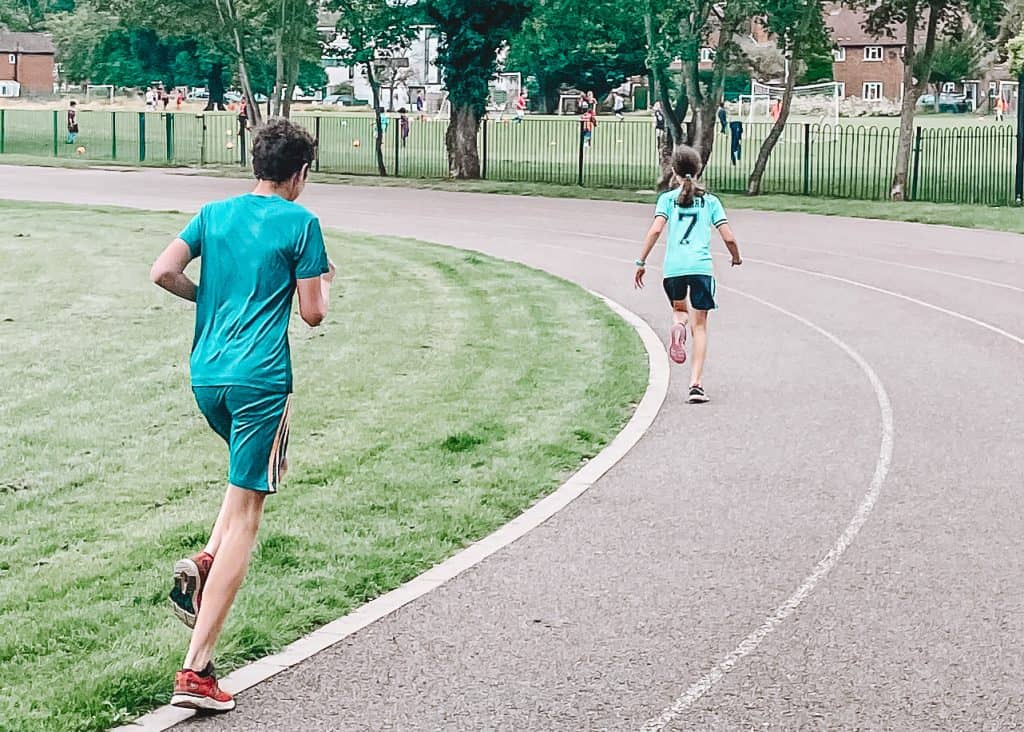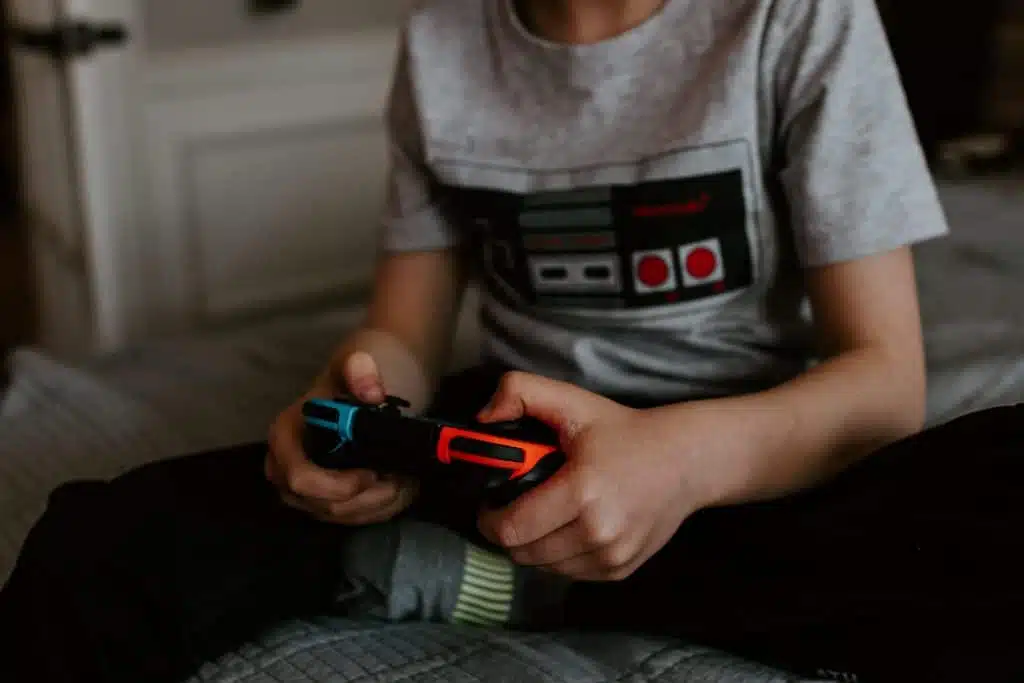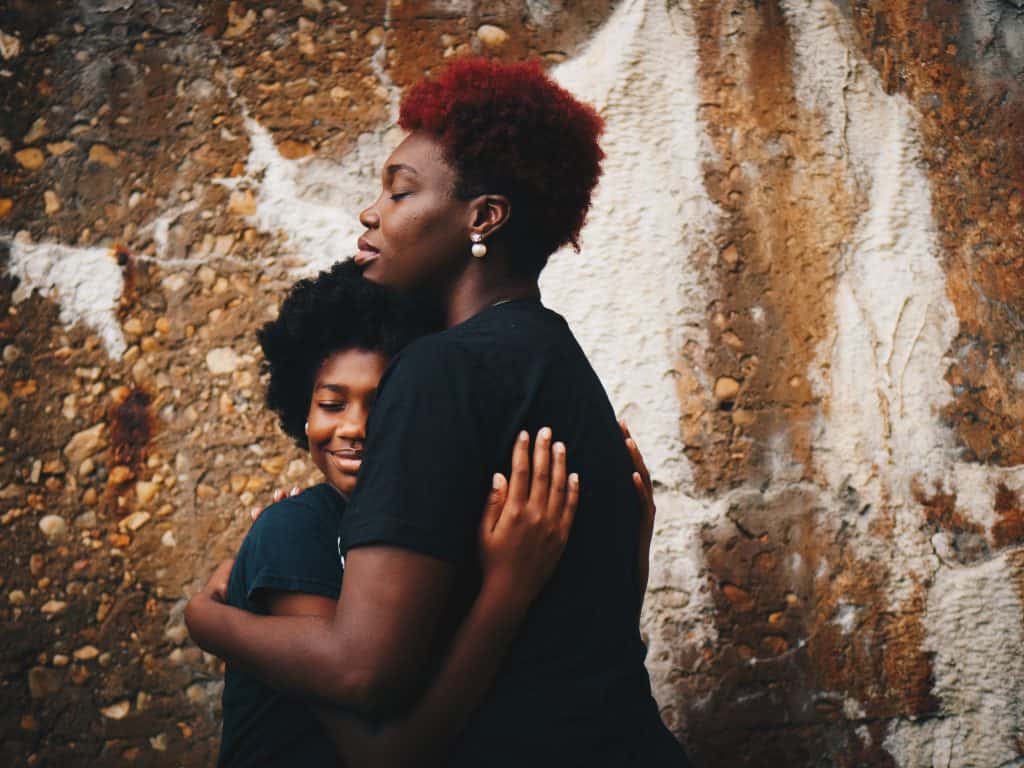Last updated on November 8th, 2024 at 01:53 pm
Wondering how to get a teenager to talk about their feelings? Our guide to parenting depressed teens is here to support you.
We cover the causes associated with teens and depression and what you can do to support them.

Parenting Depressed Teens
The question ‘Is my child depressed?’ is pertinent at the moment. I’m writing this in the midst of Children’s Mental Health Week here in the UK. This year, the theme is ‘Growing Together’ and considers how we can initiate emotional growth in ourselves, and help others to do the same.
My daughter’s school will be raising money for children’s mental health charity, Place 2 Be and she’ll be partaking in ‘Dress to Express’ this Friday. She’ll be wearing tracksuit bottoms and a hoody which is absolutely her and what she feels at home in.
It’s an opportunity for kids to understand that everyone is different and has the right to be themselves, and that’s a cause for celebration and joy. I’m hoping it goes well. Because, as we know, school isn’t always easy, and neither is life.
Many of us have faced struggles, both growing up and in adulthood. A therapist I knew once described life’s struggles as “large holes, or pits, in the road, which we sometimes fall into”. Of course, we then need help getting back out of them.
It might be the death of someone close, being bullied (either in person or online) or feeling isolated and lonely when you move to a new area.
So many life experiences can cause us to have periods of low mood. However, it can seem like there are more of those holes in the road for our children today and teen depression is a real concern. And parenting a depressed teenager isn’t easy.
Is My Child Depressed? – Symptoms of Depression in Teens
Here are some of the signs which could indicate depression in teens.
Your child experiencing one or two of these may not be cause for concern (apart from the last two). However, if they are experiencing a number of symptoms, it might be time to seek help.
- Isolating themselves and avoiding social situations
- Struggling to focus on schoolwork
- Not eating or comfort eating
- Not wanting to take part in activities they used to enjoy
- Feeling irritable and short-tempered
- Becoming tearful (and not being able to identify why)
- Being very critical of themselves and having low confidence
- Sleeping in particularly late/ not being able to get to sleep at night
- Feeling lethargic and lacking in energy
- Low interest in personal hygiene or appearance
- Self Harm
- Suicidal thoughts
A Note:
I wanted to acknowledge that some children may be experiencing more than temporary low mood. They may therefore need additional help and support for childhood depression. They may need therapeutic intervention, diagnosis and/ or medication.
It’s a good idea to consult your GP if you are concerned about your child’s low mood. You may wish to request that a referral be made to a specialist who can establish the best course of action for your child.
Hormonal changes and genetics can also play a part, so keep this in mind too.
Causes of Depression – Teens and Children
If you’ve recently been thinking ‘My child is unhappy all the time’, or you’ve been wondering how to help someone with depression, read on for some causes and potential solutions.
The question of how to overcome depression is complex and will be different for one child than for another. However, I think the ideas below are good starting points. They are the building blocks for a solid and secure foundation for children to grow and thrive.
Lack of Exercise and Depression in Kids

Children exercise much less than they used to. A 2019 study completed by the World Health Organisation found that 80% of 11 to 17-year-olds are not achieving the recommended daily levels of exercise. This is particularly the case for girls, many of whom opt out of sports entirely when they hit puberty.
Our lifestyle is significantly more sedentary than it was a couple of generations ago. We drive to work or school and we spend more time sitting at desks or on the sofa in front of the TV.
The guidance for schools in the UK is that kids should have two hours of Physical Education in school per week. However, ultimately it is left to the school to decide if they’re going to follow this advice.
The Department of Health recommends that children over the age of six years old get at least one hour of exercise per day. If they’re under six, it’s three hours. Even with the two hours in place, if children are not partaking in sports outside of school, they’re not getting nearly enough exercise.
Exercise can help children feel more alert, and calmer afterwards. When you exercise, your body releases endorphins. These are chemicals in your brain which are known to relieve pain and stress and produce a feeling of well-being, similar to the effects of morphine.
Research has shown that, in some cases, exercise can be as effective for mild to moderate depression as anti-depressants.
There are other benefits to being involved in sports for children. Usually, they’ll be part of a team, or at least training together, and so there’s a social aspect. They’ll be exposed to a range of different people and learn how to work in a group towards a common goal.
That’s something else that’s good for their mental health (see Socialising, below). In many cases, sports will be outdoors and in the fresh air, something else which is beneficial to them.
Here’s what you can do:
Check out This Girl Can. It’s a scheme set up to inspire women to get back into exercise, in whatever form that may be. Women are encouraged to be role models for girls who may have dropped out of sports during puberty, or not think of themselves as sporty. If we want our children to take exercise, we need to be an example and normalise exercise.
Look into Junior Park Run (parents can run with children), Swimathon (families can compete as a team and raise money for charity) or family triathlons.
Also, try and incorporate exercise into your daily routine. Could you cycle or walk to school together, or to the shops or to meet friends?
Poor Diet and Childhood Depression

In a 2021 study published in the British Medical Journal, the link between dietary choices and mental well-being in children was examined.
This is something which has been largely unexplored before now. It was found that a diet consisting of a higher level of fruit and vegetables (the recommended five-a-day or more) was significantly associated with higher mental well-being.
Eating breakfast and not consuming energy drinks for breakfast were also shown to have an impact on mental well-being.
Food is moving further and further away from its natural state and many of the snacks our kids are craving are high in sugar, And we know sugar is highly addictive. Diet can have a significant impact on whether we feel sluggish or energetic, tired or alert, and in a high or low mood.
If your kids will eat them, try incorporating more of the following foods into their diet:
- Eggs – They contain choline which is critical for brain development
- Chickpeas, butter beans and lentils – Add them to curries or make your own hummus dip. They contain Zinc which contributes towards normal growth and brain development
- Spinach, cabbage and kale – Blend into sauces if your child is reluctant to eat these. They contain folate and contribute towards good brain function
- Oats – Porridge for breakfast or oatcakes and peanut butter as snacks. Oats are low-GI foods and help improve cognitive function and focus
- Salmon – Provides Omega 3 fatty acids, which have been shown to boost memory and learning as well as reduce feelings of depression
- Chicken – Contains the amino acid tryptophan which produces serotonin and boosts your mood
Here’s what you can do:
Look into purchasing a good multivitamin to supplement your child’s diet, such as Vitabiotics WellKid Multivitamins .
Check out websites such as this one for nutritious recipes for kids.
Phones, Screen Time and Teen Depression

Kids don’t use their phones to call people anymore. Sure, they message each other – but they mostly use their phones to watch videos and play games. As they get older, they’re likely to start using their phone to access social media apps such as TikTok and Instagram.
A 2018 study found that extended phone use can contribute to low mood, poor emotional regulation and inability to focus. Adolescents who spend a lot of time on their phones are more likely to experience a diagnosis of anxiety or depression.
When you’re on your phone, whether that’s watching a video or checking your Instagram post, you’re not engaging with other people. At least not in the way in which you’re going to feel any benefit to your mental health or mood.
Touch, in particular, is important. A hug from someone we know and trust calms our nervous system and produces oxytocin, a hormone which makes us feel warm and safe.
Here’s what you can do:
There’s no denying that phones and social media are part of our lives and are here to stay. However, we need to learn to have control over them, rather than allow them to have control over us.
Put family rules in place. No phones at the table (that includes adults) and phones stay downstairs to charge overnight. Place limits on phone usage. Ensure children have plenty of opportunities to engage in the ‘real world’ with friends and family members.
Promote reading. Reading boosts human connectivity and empathy but also allows us to momentarily escape from any worries and anxiety we might have. Follow your child’s lead in terms of the books they are drawn to (if appropriate).
Is My Child Depressed Because They’re Gaming All The Time?

If your child is focused solely on gaming and little else, you may have asked yourself the question ‘Is my child depressed?’ more than once.
There are many elements of gaming which potentially contribute to feelings of low mood and some of them are linked to the headings above. Long periods spent gaming will mean limited movement and exercise and a lack of fresh air.
It might also mean poor nutrition (a quick snack rather than a proper meal) and little real-life interaction with other people.
This article poses an interesting question, however. It is: does gaming cause feelings of depression, or do people who are already feeling depressed turn to gaming as a form of escapism? It’s a bit of a tangled web and the answer is not clear.
However, what we do know is that gaming and depression are correlated in some way and that treating one is likely to treat the other. If gaming is being used as a crutch, it would be worth looking at alternative coping strategies and reducing time spent online.
It should be recognised that playing games online with friends did help children feel more connected to each other during the pandemic.
It is fantastic that we have the technology for our kids to be able to connect in this way during a difficult time. However, kids now need to get back into the habit of predominantly forming and maintaining relationships in person.
Here’s what you can do:
Ensure your kids are playing age-appropriate games. Violent games can cause anxiety and can change the way your child’s brain functions (read more here).
Check out Common Sense Media to find out if a particular game (or movie) is suitable for your child’s age. However, we shouldn’t rush to cut out gaming altogether. This report notes the need for a more nuanced approach.
Social Media and Parenting Depressed Teens

We all know how engaging with social media can spiral. The intention was to spend a few minutes on Instagram, and suddenly you’ve completely lost track of time. It’s a never-ending rabbit warren, some of it positive – and, some of it not.
As adults, we learn that it’s important to follow accounts that make us feel good. But kids don’t necessarily have the insight or awareness to realise that we don’t have to carry on looking at, or listening to, what’s making us feel bad. They also may not be able to identify exactly what it is that’s making them feel that way.
Constant comparison (particularly in relation to body image) and only seeing other people’s best bits wear thin. This is particularly the case for girls, and they need to be encouraged to understand that most of what they see is heavily edited.
In September 2021, Facebook paused work on Instagram Kids to address concerns over the app’s impact on teen girls’ mental health (read more here).
What is clear is that use of social media seems to predominantly have an impact on girls’ mental health and doesn’t seem to impact boys in the same way.
Here’s what you can do:
If you’ve been wondering ‘is my child depressed?’, and particularly if you have a daughter, make sure you have conversations with them about social media and its impact.
Another reason increased use of social media may lead to feelings of low mood is that the connections made online can feel less emotionally satisfying than the ones we make in real life.
Interestingly, the impact of social media on girls who have good friendships and actively engage with others offline, as well as online, is minimal, compared to those who don’t. So, promoting time spent with friends and family, activities they enjoy, exercise and fresh air, will all help. This leads us on nicely to….
Is My Child Depressed Because They’re Not Socialising Enough?

Whether you’re an introvert or an extrovert, we all need other people and a certain degree of contact with them. The amount of socialising wanted or needed, will be different for everyone.
But if we isolate ourselves, we are likely to experience feelings of loneliness and move into a self-perpetuating cycle whereby we lose the confidence to reach out to others and form relationships.
As children grow older, their peer relationships become more and more important to them. It’s tricky, as we as parents have diminishing control over who they are friends with and whether these are positive relationships or not.
A sense of self-worth is important here and will help children know when it’s time to move on when a friendship becomes one-way or otherwise unhealthy.
It’s a good idea for children to be exposed to different activities (outside of school) so that they learn to navigate different personality types, and also learn what and who they enjoy. Follow your child’s lead with regard to what they have an interest in.
Sign them up for activities they’ll enjoy and encourage them to include and have empathy for others.
Here’s what you can do:
Teach your child how to be a good friend, and what a good friendship looks like. Take a look at my article on boosting empathy in boys and my recommended book list.
Have a read of How Best To Parent Introvert Kids if you have a child who is introverted.
How to Get a Teenager to Talk About Their Feelings

Sometimes just that feeling that someone is ready and willing to hear what you have to say – and won’t judge you for it – is enough. It might be a parent (and allow your child to speak to whichever parent he feels most comfortable talking to), a grandparent, a teacher or a friend they turn to.
However, bear in mind that your child might need some extra help and that counselling could be a good option. Place 2 Be provides counselling sessions for children and advice and support for parents. If you are particularly concerned about your child, either you or your GP can refer them to CAMHS (Children and Adolescent Mental Health Services).
Kids, particularly boys, can often keep their feelings and anxieties hidden. They may not want to share them for fear of rejection or mockery.
Maintaining an open dialogue with your child from a young age, talking to them about the range of feelings they have, and validating and accepting these, can help.
Letting them know that you have faced tough times and got through them (you can share how, too) is also useful.
Lastly, parenting depressed teens can be tough for you as well. Make sure you are supported and have someone to talk to as well.
Here’s what you can do:
Order a copy of How to Talk So Kids Will Listen and Listen So Kids Will Talk or How to Talk So Teens Will Listen and Listen So Teens Will Talk.
Consider therapeutic support or consult your GP if you feel out of your depth and need more support with talking to your child about how they feel.
Feeling Under-Valued

Children experience a lack of power as they navigate their childhood. They may often feel that their feelings are disregarded and unimportant.
Kids need to feel that they are valued for the person they are, not the person you as their parent might like them to become.
If your child is quiet, don’t force them to be the centre of attention. If your child doesn’t like football, don’t keep taking them to football practice just because you loved it. Instead, look together for another sport or activity they might enjoy.
Our children are not extensions of ourselves and treating them as such, or putting high expectations upon their heads, is likely to take an emotional toll on them. We all want our children to do well.
But if we accept them for who they are, what they are able to do, and what they really enjoy, then we’re likely to have a more emotionally resilient and happy child. And a better relationship with them too.
Here’s what you can do:
Follow your child’s lead. Gone are the days when I looked at dresses or pretty tops for my daughter. She’s a hoody and tracksuit kind of girl and has been since about the age of four. And that’s fine, that’s who she is and what she feels comfortable in.
Let your child express their opinions and guide rather than correct them. Tell them what you admire about them and why you’re proud of them. Make sure you compliment them on their personal qualities or how they handled something, rather than the A grade they got in their last Maths exam.
Take a look at What We Can Learn From Foster Carers About Responsive Parenting for more tips!
And print out these 48 Affirmations for Teens for your child – they can choose which ones resonate with them!
In the meantime, for more advice on helping kids with feelings of anxiety, read How NLP For Kids Can Help With Anxiety .





Leave a Reply
You must be logged in to post a comment.